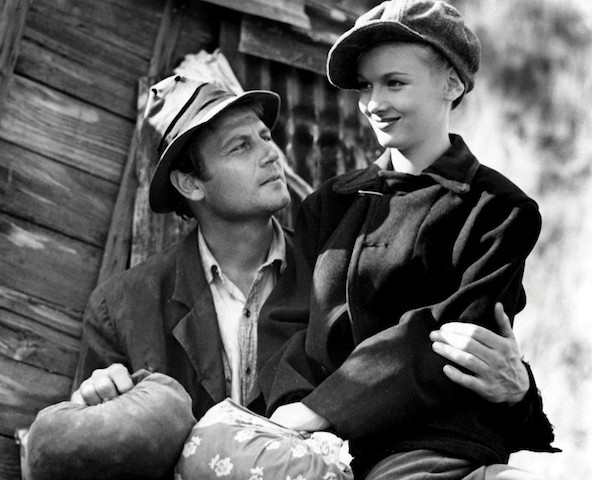1939 was such a bumper year for movies that Midnight got lost in the shuffle. It’s one of my favorite romantic comedies of all time, a fizzy, glamorous escape full of sparkling dialogue, memorable characters, and doses of true romance. The script, by the legendary team of Billy Wilder and Charles Brackett, is a master class on elegant exposition and character building. The movie’s not on any streaming outlet, so if you happen to come across it on EBay, snap it up! You won’t be disappointed.
Claudette Colbert is winsome as Eve Peabody, a street-smart New York chorus girl who’s lost everything in a casino in Monte Carlo — except for her gold lamé gown, and the pawn ticket in her bag. She ends up in a Paris train station during a downpour. Broke, she meets Tibor Czerny (Don Ameche), a taxi-driver and makes a deal with him: If he helps her find a job as a cabaret-singer, she’ll give him double the tip. She doesn’t snag a gig — “I guess mine is strictly a bathtub voice,” she shrugs. And while sparks fly between them, she’s looking for a rich man, so she douses the flame of their attraction and flees… Only to find herself crashing a very boring recital full of filthy rich patricians. And that’s where she runs into Georges Flammarion (John Barrymore), a wealthy nobleman whose wife Helene (Mary Astor) is having an affair with a cad named Jacques Picot (Francis Lederer). Luckily for Eve, Jacques is immediately taken with her, which gives Georges the idea of playing along with her lie that she’s a Hungarian countess just so she can win Jacques away from Helene and restore the Flammarion’s marriage. It sounds like a convoluted plot, but Wilder and Brackett unfold it so elegantly that you’re never lost and you’re always laughing.
One of the things I admire about what Wilder and Brackett pull off in Midnight is the elegant way they dole out information through the use of witty, seemingly throwaway lines. (Thankfully, all the actors are old hands at delivering them with the necessary dose of insouciance so that you never feel you’re being hit over the head with facts.) For instance, here’s how we learn that Eve has lost everything in a Monte Carlo casino, barely two minutes into the movie:
Train porter: Can I get your luggage?
Eve: I wish you would!
Train porter: (Looking around) Where is it?
Eve: Municipal pawn shop, Monte Carlo!
The biggest obstacle in this particular romantic comedy is Eve’s reluctance to marry someone poor, like handsome, working-class Tibor, despite their obvious rapport. An internal hurdle like this can be difficult to establish onscreen. Again, Wilder and Brackett resort to dialogue to get over this hitch. Over a cheap dinner at a cabbies’ bistro, Eve outright tells Tibor the reason she doesn’t think they’re right for each other:
Tibor: Listen if you want peace of mind, get yourself a taxicab.
Eve: No one ever found peace in a taxi, I’m looking for a limousine.
Tibor: They don’t ride any better.
Eve: They ride better than the subway. I spent most of my life in a Bronx local. Squeezed, trampled, stepped on! One day I said to myself, “That’s enough. You’re going to get somewhere!” That’s why I came abroad. I shipped to London in a can of imported chorines. You know, most of those gals ended up with a lord or something.
Tibor: Is that what you call getting somewhere?
Eve: It’s a step in the right direction.
The writers pull off what may seem like “on the nose” dialogue because the exchange works on several levels. First, just a few minutes earlier we see Eve and Tabor’s growing attraction when they dance together. Second, this information about their philosophies is new for us as the audience and for each of the characters involved — given their attraction, it’s not an unlikely conversation on a first date. The fact that this is an impromptu first date amps up the romantic element to the scene, giving the audience a reason to hear them out. Lastly, it serves to build up the characters. Eve’s use of dialogue, for instance saying she was shipped abroad in “a can of imported chorines” instead of sardines, shows she’s smart and has a sense of humor — softening the edge of what could come off as harshly materialistic. This has the added advantage of rounding out Eve’s character — she wants to be ruthlessly hard-nosed, but keeps running up against her own better instincts and internal ethics. She’s not just a good, pure girl, in other words.
It wasn’t uncommon for female characters in 30s movies to be this hard-nosed. In the middle of a world-wide depression, audiences were more sympathetic to women wanting to marry for money and many of the plots that Hollywood churned out in those days were frank about depicting women willing to do anything to get rich. However, Eve is a bit different from the typical gold digger. The whole point of the movie is that she’s actually a romantic at heart, she just has to find it out for herself.
I hope you give Midnight a chance. Asides from being a comedy classic and a genuinely romantic movie, it’s a great example of topnotch screenwriting on multiple levels and well worth watching over and over again.


